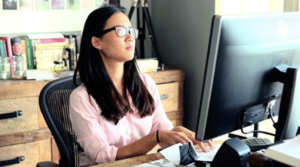Transcription
There are mistakes that we all make when learning a new language, and which block our progress.
Today, we're going to take a look at 7 things you might be doing, or even certainly are doing, that are blocking your progress in French.
Of course, for each of these things that are blocking your progress, I'll give you some advice or solutions.
You'll see, mistake number 7 is very important.
Almost all of you do it, and it's this very thing that's holding me back in my progress in Italian and English.
Let's start right away with the first thing that blocks your progress.
It's to set subtitles in your language or in English when you watch a video in French.
A video on YouTube, a movie or a series.
You think it helps you understand, and it does, because in reality you can't even hear French.
You just read the subtitles.
As a result, you don't learn any new words. You're not testing your French skills at all, and that's a shame.
I really advise you to put the subtitles always in French.
Of course, there are words you won't understand, but there are also many words you'll learn and understand thanks to the context.
And those words, I promise you, you're going to remember them for a lot longer because you learned them in a situation.
🚀 Transform your understanding of French IN 15 MINUTES A DAY
60 dialogues to boost your understanding of French 🇫🇷
If there are words you don't understand at all when you watch a video in French, I suggest you write them down and check out their meanings later, when you finish your film or series.
You'll see, it will really help you get back into the context and memorize those new words.
Second mistake far too often and you do it constantly and it's not your fault.
Because that's how you learn a foreign language at school.
It's studying lists and lists of vocabulary in French without any context.
You may learn a lot of vocabulary in the short term, but in the long term, you will remember very few of those words.
On top of that, when you want to use them in a sentence, you'll get stuck because you don't always know how to correctly use these words in a sentence, for example with which preposition or if it's a verb, how to conjugate it correctly?
Once again, I'd advise you to learn words in context, through films, books or dialogues, for example.
Speaking of dialogues, I know you love learning new words and practicing your French with authentic conversations.
So I've decided to open up to you, exceptionally, a dialogue that is normally reserved for my school's students online on my website.
This is an authentic conversation with my brother in which we talk about cinema, about the films he recently went to see at the cinema. And you have a vocabulary sheet to help you, as well as a transcript.
To access this content, simply click on the link in the description of this video and you will receive it by email.
Third thing you do that blocks your progress.
You don't listen to the same content over and over again, and you don't practice spaced repetition.
We all have short-term and long-term memories. When you're studying vocabulary, you feel like you've memorized it all very quickly, and you tell yourself that it's okay, you know these words.
Yet they're only in your short-term memory. If you really want to retain them for a long time, to get them into your long-term memory, you have to revise them.
To do this, you must review the same content many times.
Of course, choose videos or content that interest you so you don't get bored.
You're going to watch a video and learn some vocabulary. That's fine. Three days later, you should watch the video again or test yourself on the vocabulary to see if you still have it in your head.
Maybe it will still be fresh in your mind and that's fine.
You should then test yourself about ten days later to see what words you still know and really anchor what you have somewhat forgotten in your long-term memory.
Then you can repeat the exercise, for example two weeks later and then a month later.
That's really how you're going to get all that vocabulary, all those expressions, into your long-term memory and know them forever.
Fourth mistake that we all do, and again, it's not your fault, and I'll tell you a personal story.
It's not learning French or a foreign language with content that's interesting to us.
For example, when I was at school learning English, they made me read books I didn't like, like science fiction, and I'm not interested in that at all.
For a long time I thought I hated reading in English, but in fact it wasn't that I didn't like reading in English, it was that I didn't like the content my English teachers made me read.
So it's essential that you only choose content that interests you, so you don't get bored of learning French.
For example, if you're a history buff, choose videos about history.
If you like news, you can watch news channels in French.
If you like to cook, again, instead of looking at recipes in your language, look at them in French.
Fifth mistake, and I don't want any excuses from you.
I know you're very busy, but this mistake is not practicing French every day.
I'm going to give you some ideas on how you can find time to practice it, even if you're really busy in your day.
As you know, and as everyone says, you have to practice at least a little bit every day to learn French progressively.
It is better to do 15 minutes of French once a day than four hours once a month or two hours every two weeks.
It won't work and you'll be a bit disgusted because you'll spend a lot of time trying to learn French and you'll make very little progress.
Every day you have to do some French, but how do you find the time?
It's very simple.
For example, every day you probably drive to work or take public transportation.
Every day you brush your teeth.
Every day, you cook the meal.
Well, all these moments are moments when you are available, when your brain is available to listen to French.
For example, while you are cooking, you can put on a podcast in French. While you are brushing your teeth, you can put a YouTube video in French in the background.
You have to take advantage of all those little moments when you are physically busy, but your brain is totally available.
Another good time to practice French is at the gym, for example.
When I'm riding my bike, I like to put videos, series for example, in English with English subtitles.
It allows me to make double use of my time, both by doing sports and by improving my English.
Sixth mistake you makeyou're certainly not practicing your oral expression enough.
You don't speak enough French, and that's essential if you're to be proactive in your learning.
I know it's the most complicated thing to set up because you have to find someone to talk to.
You may already know that I offer private online conversation lessons, and I'm trying to open up as many slots as possible, so don't hesitate to take a look at my website if you'd like to book a slot.
But if you'd rather talk to other people - if you're looking for people to talk to in French in your town, for example - there may be an Alliance Française that organizes events.
And I know that there are also online language exchange sites where you can find French-speaking pen pals.
And finally, one last thing that you're most certainly doing and that's blocking your progress, and I've told you, I'm doing that too, you're not being kind enough to yourself.
And I'm not kind enough to myself when it comes to learning other languages.
We never take the time to congratulate ourselves on what we've already learned, on the progress we've already made in the language.
Very often, we only see what we still have to learn.
There is an expression in French that is "voir le verre à moitié vide".
This means you only see the negative aspects, you only see what you still have to do and not what you've already done.
You need to change your mindset and see the glass as half full.
You have to congratulate yourself, say "Well done! I've already learned a lot. I still have a lot to learn, but I'm already proud of my progress."
And you'll see, it will give you more confidence and it will really help you to progress.
Self-confidence is the key to daring to speak in another language, to daring to speak in French and not blocking.
You should be proud of what you have already learned.
You should be proud of your current French.
For example, sometimes when you're talking to someone, you're so stressed about making mistakes that you'll answer very briefly.
You will just answer "yes", "no".
You have to try to change that.
Try to force yourself to make a complete sentence.
For example, if someone asks you, "How are you?" don't just say, "I'm fine."
Try to develop a little.
For example, you might say, "Yes, I'm fine, because it's a beautiful day today, the sunshine puts me in a good mood."
The video is finished.
I hope you enjoyed it.
It was a video that was a little different from what I'm used to doing.
Please let me know in the comments if you'd like more tips, more videos like this one to help you learn French.
Before leaving this video, don't forget to "like" it and subscribe if you haven't already.
And don't forget to click on the link in the description to receive a dialogue by e-mail and practice your French with an authentic conversation.
See you soon.







